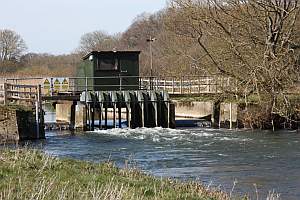Globally, Atlantic salmon have suffered a massive 70 per cent decline in the past 30 years and this continuing downward spiral has triggered a major new research collaboration by British and French scientists who are pooling expertise, resources and 30 years of data to maximise current international research efforts.
This significant 3-year collaborative study called the MorFish (Monitoring for Migratory Fish) project comprises two leading research partners, including the Game & Wildlife Conservation Trust, a leading UK research charity, and the Institut National de la Recherche-Agronomique (INRA), a French Government research agency, as well as a range of stakeholders including government departments, conservation organisations and local communities.
Funding amounting to 2.5m Euro for this important initiative has been achieved through the European Union’s Interreg 1VA France (Channell) – England programme, which encourages cross-border partnerships and demonstrates the importance placed on the potential of the MorFish project to unlock some of the complexities of salmon declines.
 Unfortunately, there isn’t an easy solution for reversing the decline in salmon populations – everything from overfishing, climate change and habitat destruction have been linked to salmon depletion. The fish’s complicated life cycle – salmon begin life in a stream, migrate to sea for their adult life and finally return to their birthplace in order to reproduce – makes it even harder to pinpoint the primary factors leading to each population’s fall.
Unfortunately, there isn’t an easy solution for reversing the decline in salmon populations – everything from overfishing, climate change and habitat destruction have been linked to salmon depletion. The fish’s complicated life cycle – salmon begin life in a stream, migrate to sea for their adult life and finally return to their birthplace in order to reproduce – makes it even harder to pinpoint the primary factors leading to each population’s fall.
Dylan Roberts, Head of Fisheries Research with the GWCT explains the relevance of the new MorFish Project. He said, “With collapses in salmon populations continuing there is an urgent need to gain a better understanding of the causes of these declines. Mostly these relate to environmental change both in freshwater and marine habitats as well as climate change. Both the GWCT and INRA between them hold more than 30 years of under-exploited data on salmon and by combining our considerable experience, expertise and technologies we believe that this cross-border research effort will add considerably to the pool of knowledge currently available to the international scientific community.”
The GWCT’s Salmon & Trout Research Centre on the River Frome in Dorset, is one of the most technically advanced salmon monitoring centres in the country and has been counting, tagging and monitoring salmon since 1973. This advanced river laboratory is providing the most comprehensive record of salmon movement in England and Wales and complements the work being carried out by the INRA in France on the rivers Scorffe and Oir.
According to the MorFish partners, the project will make the monitoring and data collection work already achieved on migratory fish in the Channel zone much more compatible, useful and more available.
Dylan Roberts concludes, “We are particularly concerned about the future of southern European stocks of salmon which are under threat from recent as well as future changes in climate. Although the issue of migratory fish decline is global, we believe that to address this massive problem requires local, regional, national and cross-border cooperation. The project aims to do just this and the results will help us gain a much better understanding of cross-border biodiversity as well as helping to improve the protection and preservation of this iconic species, which is so important to us all both economically and ecologically.”








